This co-authored paper, by the European Association of Development  Research and Training Institutes (EADI) and INTRAC, examines the legal frameworks and political space for NGOs to operate in selected countries in order to suggest appropriate approaches for supporting civil society in difficult political contexts. The cases examined were Bangladesh, Ethiopia, Honduras, Kyrgyzstan, Serbia and Uganda. The study is motivated by growing concern over the ability of civil society to fulfil its core functions, especially in the areas of governance and human rights.
Research and Training Institutes (EADI) and INTRAC, examines the legal frameworks and political space for NGOs to operate in selected countries in order to suggest appropriate approaches for supporting civil society in difficult political contexts. The cases examined were Bangladesh, Ethiopia, Honduras, Kyrgyzstan, Serbia and Uganda. The study is motivated by growing concern over the ability of civil society to fulfil its core functions, especially in the areas of governance and human rights.
The past decade has seen diverse trends; new spaces and enabling environments have opened up for civil society in some contexts, but shrunk in other contexts. Civil society actors have increasingly been recognised as significant actors in global processes. For example, the Busan Partnership for Development Effectiveness stresses the need for enabling environments to be created for civil society organisations (CSOs). At the same time, civil society freedoms have been restricted in a number of countries by new legal initiatives. This tendency has been justified partly by the post-2001 security agenda, and partly by the interests of repressive regimes. The case studies look deeper into these trends in a variety of societal contexts.
Download:
Legal-Frameworks-and-Political-Space-for-NGOs-An-Overview of Six Coutries
.pdf (0.85mb)